COMR2010: Reflective Report on Cultural Diversity Analysis
VerifiedAdded on 2022/11/24
|7
|1619
|360
Journal and Reflective Writing
AI Summary
This reflective report, completed for the COMR2010 module, delves into the student's personal perspective on cultural diversity, drawing upon readings and videos from the course. The report examines self and social identity through the lens of self-categorization theory and intersectionality, highlighting the impact of ideology and intercultural communication. The student reflects on their experiences in Australia, contrasting the culture with their Nigerian background, and discusses the importance of critical thinking and negotiating multiple identities in a multicultural environment. Key concepts include intercultural communication, the danger of a single story, and the influence of national culture, with references to various sources including Ted Talks and academic articles. The report emphasizes the development of intercultural competence and the application of these concepts in a globalized world.
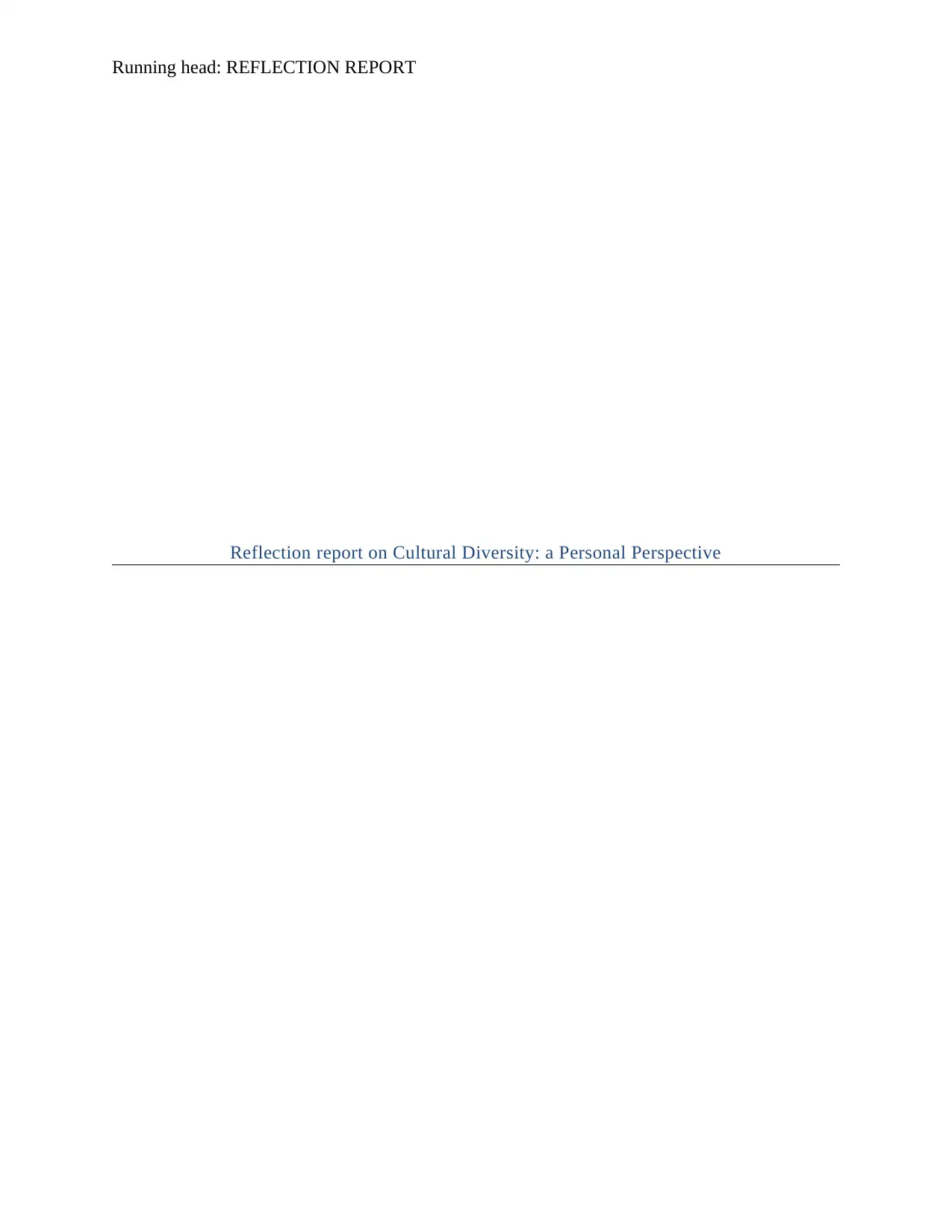
Running head: REFLECTION REPORT
Reflection report on Cultural Diversity: a Personal Perspective
Reflection report on Cultural Diversity: a Personal Perspective
Paraphrase This Document
Need a fresh take? Get an instant paraphrase of this document with our AI Paraphraser
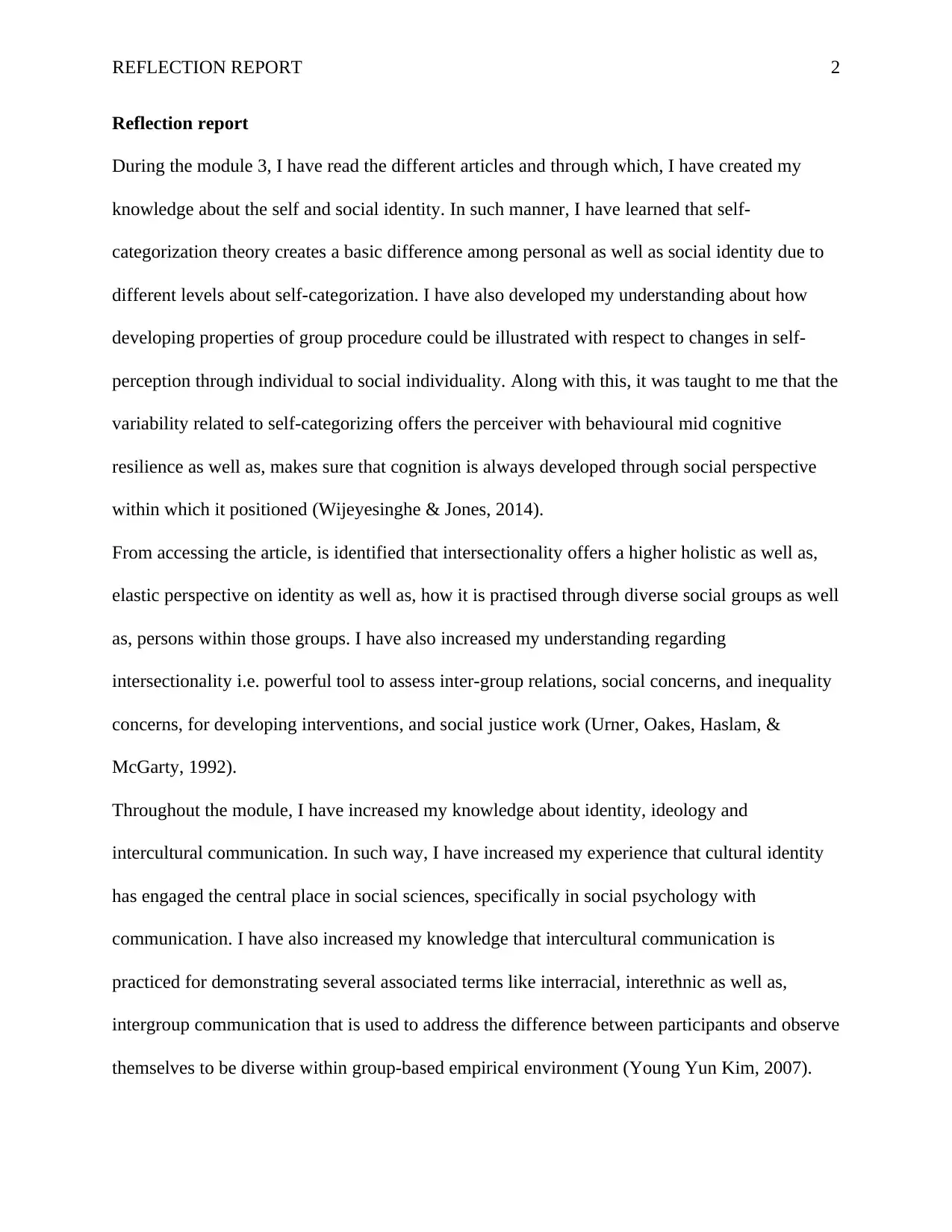
REFLECTION REPORT 2
Reflection report
During the module 3, I have read the different articles and through which, I have created my
knowledge about the self and social identity. In such manner, I have learned that self-
categorization theory creates a basic difference among personal as well as social identity due to
different levels about self-categorization. I have also developed my understanding about how
developing properties of group procedure could be illustrated with respect to changes in self-
perception through individual to social individuality. Along with this, it was taught to me that the
variability related to self-categorizing offers the perceiver with behavioural mid cognitive
resilience as well as, makes sure that cognition is always developed through social perspective
within which it positioned (Wijeyesinghe & Jones, 2014).
From accessing the article, is identified that intersectionality offers a higher holistic as well as,
elastic perspective on identity as well as, how it is practised through diverse social groups as well
as, persons within those groups. I have also increased my understanding regarding
intersectionality i.e. powerful tool to assess inter-group relations, social concerns, and inequality
concerns, for developing interventions, and social justice work (Urner, Oakes, Haslam, &
McGarty, 1992).
Throughout the module, I have increased my knowledge about identity, ideology and
intercultural communication. In such way, I have increased my experience that cultural identity
has engaged the central place in social sciences, specifically in social psychology with
communication. I have also increased my knowledge that intercultural communication is
practiced for demonstrating several associated terms like interracial, interethnic as well as,
intergroup communication that is used to address the difference between participants and observe
themselves to be diverse within group-based empirical environment (Young Yun Kim, 2007).
Reflection report
During the module 3, I have read the different articles and through which, I have created my
knowledge about the self and social identity. In such manner, I have learned that self-
categorization theory creates a basic difference among personal as well as social identity due to
different levels about self-categorization. I have also developed my understanding about how
developing properties of group procedure could be illustrated with respect to changes in self-
perception through individual to social individuality. Along with this, it was taught to me that the
variability related to self-categorizing offers the perceiver with behavioural mid cognitive
resilience as well as, makes sure that cognition is always developed through social perspective
within which it positioned (Wijeyesinghe & Jones, 2014).
From accessing the article, is identified that intersectionality offers a higher holistic as well as,
elastic perspective on identity as well as, how it is practised through diverse social groups as well
as, persons within those groups. I have also increased my understanding regarding
intersectionality i.e. powerful tool to assess inter-group relations, social concerns, and inequality
concerns, for developing interventions, and social justice work (Urner, Oakes, Haslam, &
McGarty, 1992).
Throughout the module, I have increased my knowledge about identity, ideology and
intercultural communication. In such way, I have increased my experience that cultural identity
has engaged the central place in social sciences, specifically in social psychology with
communication. I have also increased my knowledge that intercultural communication is
practiced for demonstrating several associated terms like interracial, interethnic as well as,
intergroup communication that is used to address the difference between participants and observe
themselves to be diverse within group-based empirical environment (Young Yun Kim, 2007).
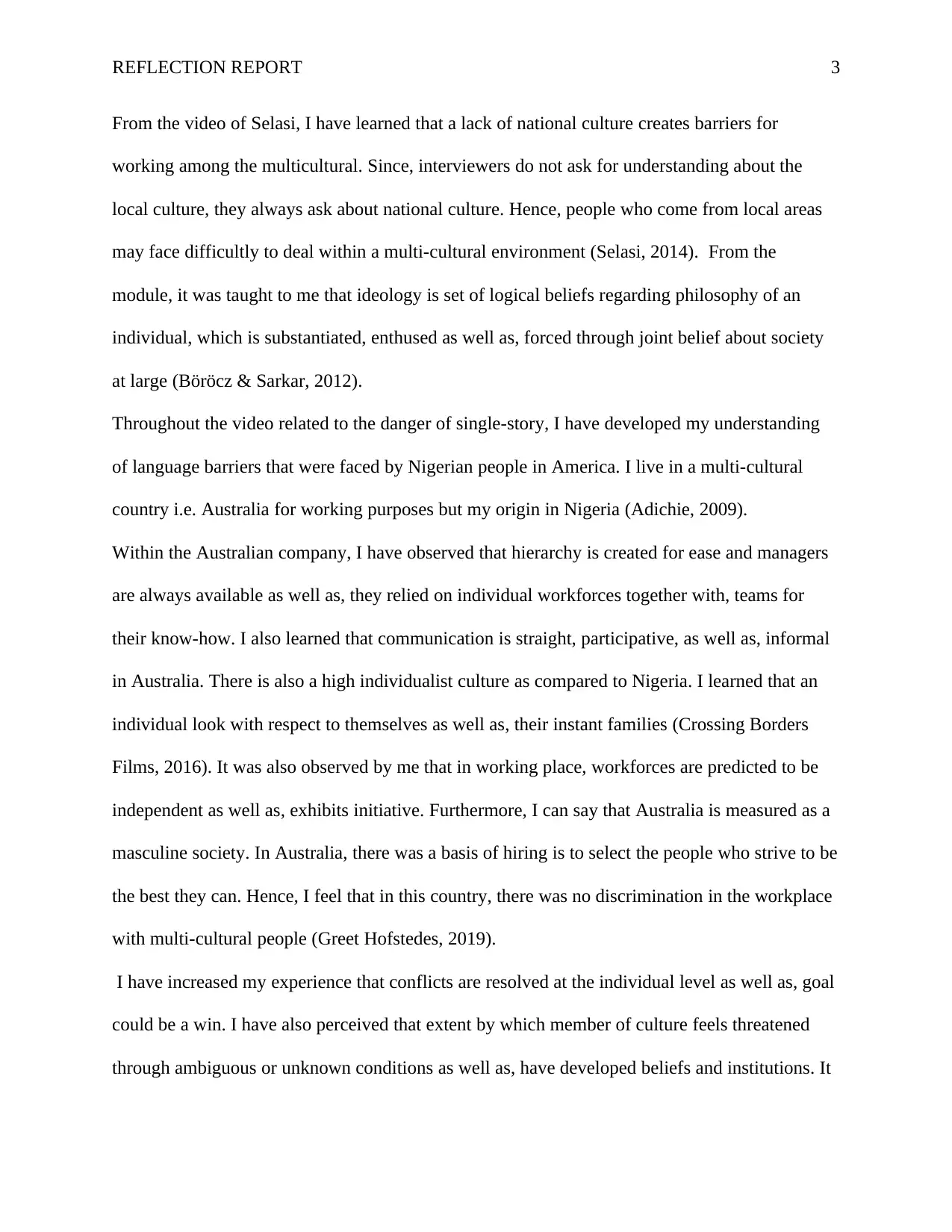
REFLECTION REPORT 3
From the video of Selasi, I have learned that a lack of national culture creates barriers for
working among the multicultural. Since, interviewers do not ask for understanding about the
local culture, they always ask about national culture. Hence, people who come from local areas
may face difficultly to deal within a multi-cultural environment (Selasi, 2014). From the
module, it was taught to me that ideology is set of logical beliefs regarding philosophy of an
individual, which is substantiated, enthused as well as, forced through joint belief about society
at large (Böröcz & Sarkar, 2012).
Throughout the video related to the danger of single-story, I have developed my understanding
of language barriers that were faced by Nigerian people in America. I live in a multi-cultural
country i.e. Australia for working purposes but my origin in Nigeria (Adichie, 2009).
Within the Australian company, I have observed that hierarchy is created for ease and managers
are always available as well as, they relied on individual workforces together with, teams for
their know-how. I also learned that communication is straight, participative, as well as, informal
in Australia. There is also a high individualist culture as compared to Nigeria. I learned that an
individual look with respect to themselves as well as, their instant families (Crossing Borders
Films, 2016). It was also observed by me that in working place, workforces are predicted to be
independent as well as, exhibits initiative. Furthermore, I can say that Australia is measured as a
masculine society. In Australia, there was a basis of hiring is to select the people who strive to be
the best they can. Hence, I feel that in this country, there was no discrimination in the workplace
with multi-cultural people (Greet Hofstedes, 2019).
I have increased my experience that conflicts are resolved at the individual level as well as, goal
could be a win. I have also perceived that extent by which member of culture feels threatened
through ambiguous or unknown conditions as well as, have developed beliefs and institutions. It
From the video of Selasi, I have learned that a lack of national culture creates barriers for
working among the multicultural. Since, interviewers do not ask for understanding about the
local culture, they always ask about national culture. Hence, people who come from local areas
may face difficultly to deal within a multi-cultural environment (Selasi, 2014). From the
module, it was taught to me that ideology is set of logical beliefs regarding philosophy of an
individual, which is substantiated, enthused as well as, forced through joint belief about society
at large (Böröcz & Sarkar, 2012).
Throughout the video related to the danger of single-story, I have developed my understanding
of language barriers that were faced by Nigerian people in America. I live in a multi-cultural
country i.e. Australia for working purposes but my origin in Nigeria (Adichie, 2009).
Within the Australian company, I have observed that hierarchy is created for ease and managers
are always available as well as, they relied on individual workforces together with, teams for
their know-how. I also learned that communication is straight, participative, as well as, informal
in Australia. There is also a high individualist culture as compared to Nigeria. I learned that an
individual look with respect to themselves as well as, their instant families (Crossing Borders
Films, 2016). It was also observed by me that in working place, workforces are predicted to be
independent as well as, exhibits initiative. Furthermore, I can say that Australia is measured as a
masculine society. In Australia, there was a basis of hiring is to select the people who strive to be
the best they can. Hence, I feel that in this country, there was no discrimination in the workplace
with multi-cultural people (Greet Hofstedes, 2019).
I have increased my experience that conflicts are resolved at the individual level as well as, goal
could be a win. I have also perceived that extent by which member of culture feels threatened
through ambiguous or unknown conditions as well as, have developed beliefs and institutions. It
⊘ This is a preview!⊘
Do you want full access?
Subscribe today to unlock all pages.

Trusted by 1+ million students worldwide
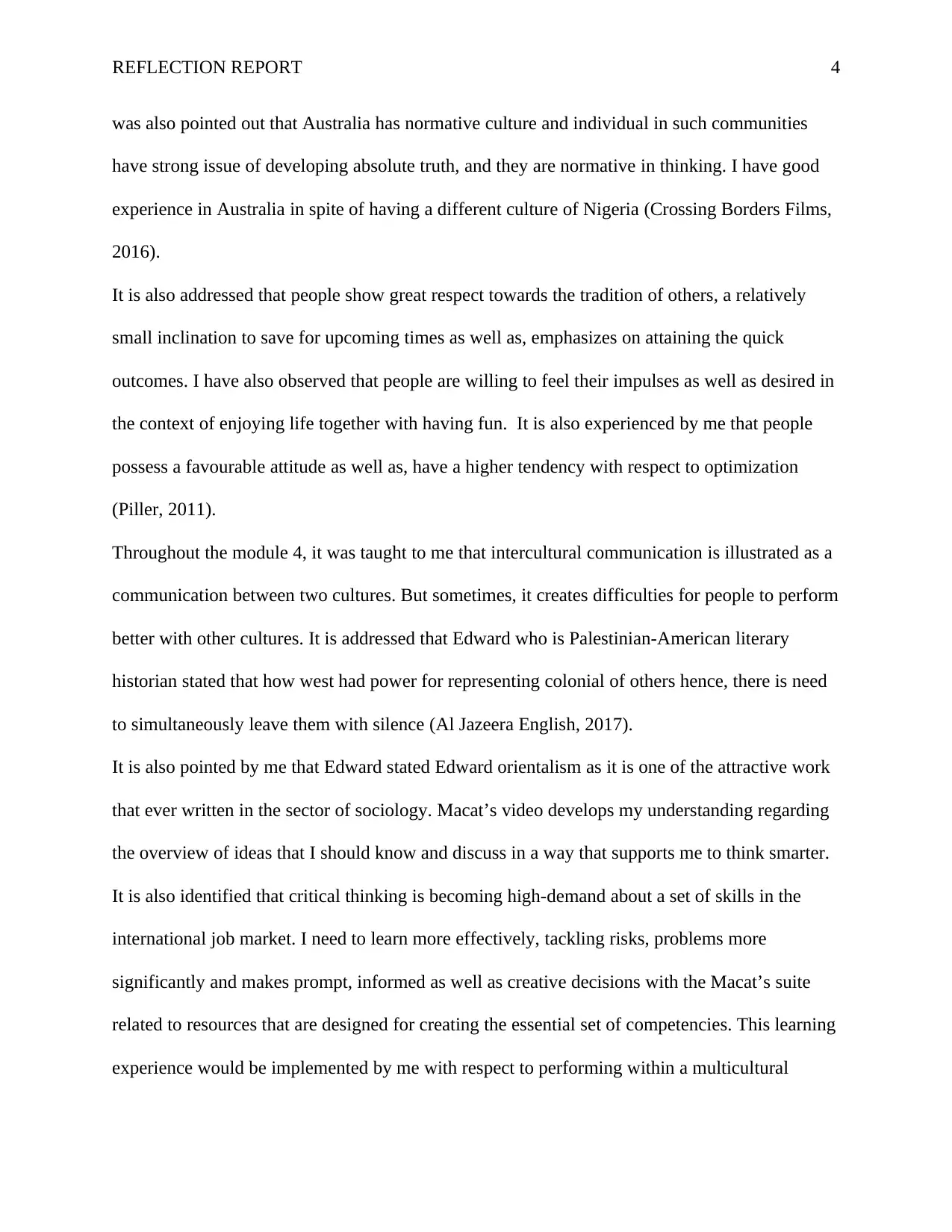
REFLECTION REPORT 4
was also pointed out that Australia has normative culture and individual in such communities
have strong issue of developing absolute truth, and they are normative in thinking. I have good
experience in Australia in spite of having a different culture of Nigeria (Crossing Borders Films,
2016).
It is also addressed that people show great respect towards the tradition of others, a relatively
small inclination to save for upcoming times as well as, emphasizes on attaining the quick
outcomes. I have also observed that people are willing to feel their impulses as well as desired in
the context of enjoying life together with having fun. It is also experienced by me that people
possess a favourable attitude as well as, have a higher tendency with respect to optimization
(Piller, 2011).
Throughout the module 4, it was taught to me that intercultural communication is illustrated as a
communication between two cultures. But sometimes, it creates difficulties for people to perform
better with other cultures. It is addressed that Edward who is Palestinian-American literary
historian stated that how west had power for representing colonial of others hence, there is need
to simultaneously leave them with silence (Al Jazeera English, 2017).
It is also pointed by me that Edward stated Edward orientalism as it is one of the attractive work
that ever written in the sector of sociology. Macat’s video develops my understanding regarding
the overview of ideas that I should know and discuss in a way that supports me to think smarter.
It is also identified that critical thinking is becoming high-demand about a set of skills in the
international job market. I need to learn more effectively, tackling risks, problems more
significantly and makes prompt, informed as well as creative decisions with the Macat’s suite
related to resources that are designed for creating the essential set of competencies. This learning
experience would be implemented by me with respect to performing within a multicultural
was also pointed out that Australia has normative culture and individual in such communities
have strong issue of developing absolute truth, and they are normative in thinking. I have good
experience in Australia in spite of having a different culture of Nigeria (Crossing Borders Films,
2016).
It is also addressed that people show great respect towards the tradition of others, a relatively
small inclination to save for upcoming times as well as, emphasizes on attaining the quick
outcomes. I have also observed that people are willing to feel their impulses as well as desired in
the context of enjoying life together with having fun. It is also experienced by me that people
possess a favourable attitude as well as, have a higher tendency with respect to optimization
(Piller, 2011).
Throughout the module 4, it was taught to me that intercultural communication is illustrated as a
communication between two cultures. But sometimes, it creates difficulties for people to perform
better with other cultures. It is addressed that Edward who is Palestinian-American literary
historian stated that how west had power for representing colonial of others hence, there is need
to simultaneously leave them with silence (Al Jazeera English, 2017).
It is also pointed by me that Edward stated Edward orientalism as it is one of the attractive work
that ever written in the sector of sociology. Macat’s video develops my understanding regarding
the overview of ideas that I should know and discuss in a way that supports me to think smarter.
It is also identified that critical thinking is becoming high-demand about a set of skills in the
international job market. I need to learn more effectively, tackling risks, problems more
significantly and makes prompt, informed as well as creative decisions with the Macat’s suite
related to resources that are designed for creating the essential set of competencies. This learning
experience would be implemented by me with respect to performing within a multicultural
Paraphrase This Document
Need a fresh take? Get an instant paraphrase of this document with our AI Paraphraser
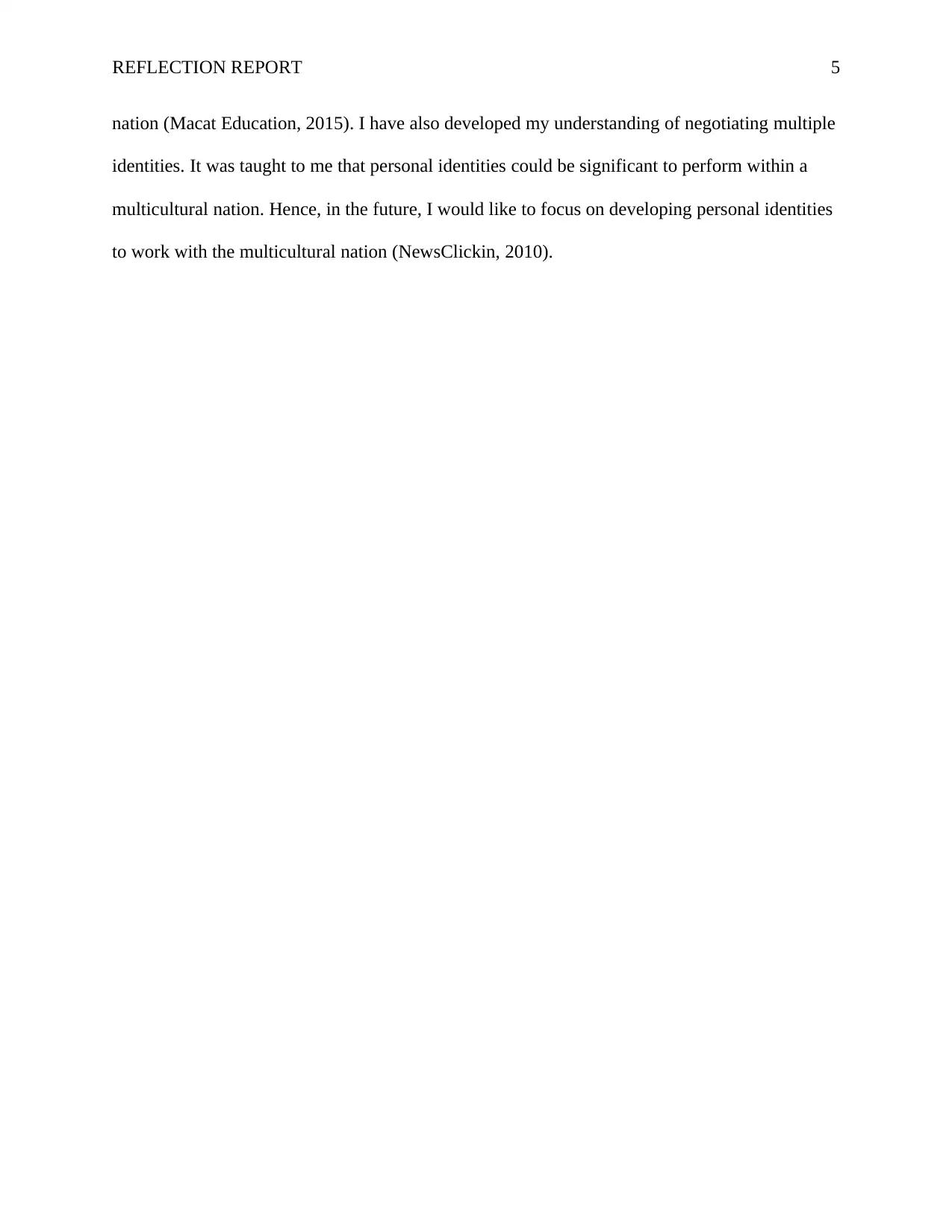
REFLECTION REPORT 5
nation (Macat Education, 2015). I have also developed my understanding of negotiating multiple
identities. It was taught to me that personal identities could be significant to perform within a
multicultural nation. Hence, in the future, I would like to focus on developing personal identities
to work with the multicultural nation (NewsClickin, 2010).
nation (Macat Education, 2015). I have also developed my understanding of negotiating multiple
identities. It was taught to me that personal identities could be significant to perform within a
multicultural nation. Hence, in the future, I would like to focus on developing personal identities
to work with the multicultural nation (NewsClickin, 2010).
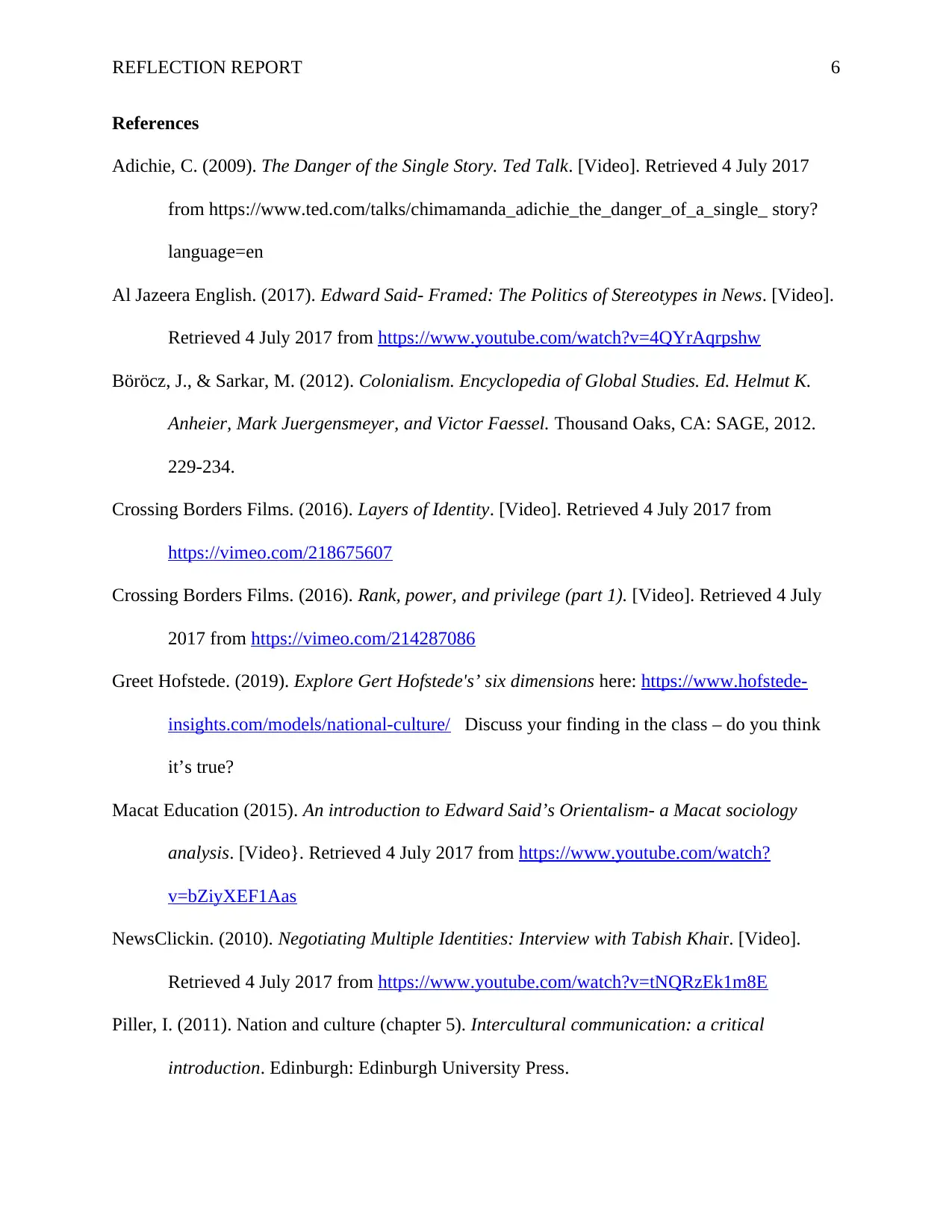
REFLECTION REPORT 6
References
Adichie, C. (2009). The Danger of the Single Story. Ted Talk. [Video]. Retrieved 4 July 2017
from https://www.ted.com/talks/chimamanda_adichie_the_danger_of_a_single_ story?
language=en
Al Jazeera English. (2017). Edward Said- Framed: The Politics of Stereotypes in News. [Video].
Retrieved 4 July 2017 from https://www.youtube.com/watch?v=4QYrAqrpshw
Böröcz, J., & Sarkar, M. (2012). Colonialism. Encyclopedia of Global Studies. Ed. Helmut K.
Anheier, Mark Juergensmeyer, and Victor Faessel. Thousand Oaks, CA: SAGE, 2012.
229-234.
Crossing Borders Films. (2016). Layers of Identity. [Video]. Retrieved 4 July 2017 from
https://vimeo.com/218675607
Crossing Borders Films. (2016). Rank, power, and privilege (part 1). [Video]. Retrieved 4 July
2017 from https://vimeo.com/214287086
Greet Hofstede. (2019). Explore Gert Hofstede's’ six dimensions here: https://www.hofstede-
insights.com/models/national-culture/ Discuss your finding in the class – do you think
it’s true?
Macat Education (2015). An introduction to Edward Said’s Orientalism- a Macat sociology
analysis. [Video}. Retrieved 4 July 2017 from https://www.youtube.com/watch?
v=bZiyXEF1Aas
NewsClickin. (2010). Negotiating Multiple Identities: Interview with Tabish Khair. [Video].
Retrieved 4 July 2017 from https://www.youtube.com/watch?v=tNQRzEk1m8E
Piller, I. (2011). Nation and culture (chapter 5). Intercultural communication: a critical
introduction. Edinburgh: Edinburgh University Press.
References
Adichie, C. (2009). The Danger of the Single Story. Ted Talk. [Video]. Retrieved 4 July 2017
from https://www.ted.com/talks/chimamanda_adichie_the_danger_of_a_single_ story?
language=en
Al Jazeera English. (2017). Edward Said- Framed: The Politics of Stereotypes in News. [Video].
Retrieved 4 July 2017 from https://www.youtube.com/watch?v=4QYrAqrpshw
Böröcz, J., & Sarkar, M. (2012). Colonialism. Encyclopedia of Global Studies. Ed. Helmut K.
Anheier, Mark Juergensmeyer, and Victor Faessel. Thousand Oaks, CA: SAGE, 2012.
229-234.
Crossing Borders Films. (2016). Layers of Identity. [Video]. Retrieved 4 July 2017 from
https://vimeo.com/218675607
Crossing Borders Films. (2016). Rank, power, and privilege (part 1). [Video]. Retrieved 4 July
2017 from https://vimeo.com/214287086
Greet Hofstede. (2019). Explore Gert Hofstede's’ six dimensions here: https://www.hofstede-
insights.com/models/national-culture/ Discuss your finding in the class – do you think
it’s true?
Macat Education (2015). An introduction to Edward Said’s Orientalism- a Macat sociology
analysis. [Video}. Retrieved 4 July 2017 from https://www.youtube.com/watch?
v=bZiyXEF1Aas
NewsClickin. (2010). Negotiating Multiple Identities: Interview with Tabish Khair. [Video].
Retrieved 4 July 2017 from https://www.youtube.com/watch?v=tNQRzEk1m8E
Piller, I. (2011). Nation and culture (chapter 5). Intercultural communication: a critical
introduction. Edinburgh: Edinburgh University Press.
⊘ This is a preview!⊘
Do you want full access?
Subscribe today to unlock all pages.

Trusted by 1+ million students worldwide
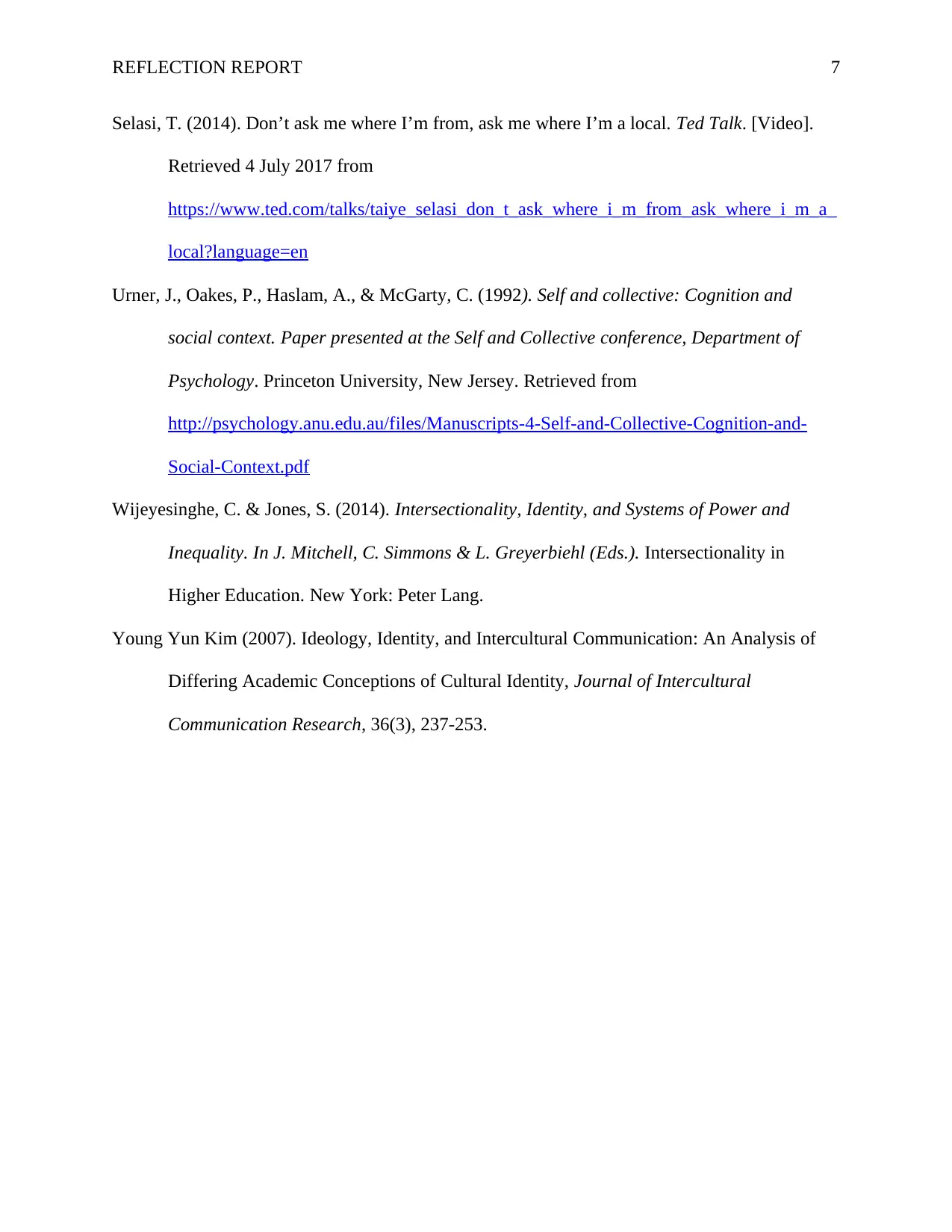
REFLECTION REPORT 7
Selasi, T. (2014). Don’t ask me where I’m from, ask me where I’m a local. Ted Talk. [Video].
Retrieved 4 July 2017 from
https://www.ted.com/talks/taiye_selasi_don_t_ask_where_i_m_from_ask_where_i_m_a_
local?language=en
Urner, J., Oakes, P., Haslam, A., & McGarty, C. (1992). Self and collective: Cognition and
social context. Paper presented at the Self and Collective conference, Department of
Psychology. Princeton University, New Jersey. Retrieved from
http://psychology.anu.edu.au/files/Manuscripts-4-Self-and-Collective-Cognition-and-
Social-Context.pdf
Wijeyesinghe, C. & Jones, S. (2014). Intersectionality, Identity, and Systems of Power and
Inequality. In J. Mitchell, C. Simmons & L. Greyerbiehl (Eds.). Intersectionality in
Higher Education. New York: Peter Lang.
Young Yun Kim (2007). Ideology, Identity, and Intercultural Communication: An Analysis of
Differing Academic Conceptions of Cultural Identity, Journal of Intercultural
Communication Research, 36(3), 237-253.
Selasi, T. (2014). Don’t ask me where I’m from, ask me where I’m a local. Ted Talk. [Video].
Retrieved 4 July 2017 from
https://www.ted.com/talks/taiye_selasi_don_t_ask_where_i_m_from_ask_where_i_m_a_
local?language=en
Urner, J., Oakes, P., Haslam, A., & McGarty, C. (1992). Self and collective: Cognition and
social context. Paper presented at the Self and Collective conference, Department of
Psychology. Princeton University, New Jersey. Retrieved from
http://psychology.anu.edu.au/files/Manuscripts-4-Self-and-Collective-Cognition-and-
Social-Context.pdf
Wijeyesinghe, C. & Jones, S. (2014). Intersectionality, Identity, and Systems of Power and
Inequality. In J. Mitchell, C. Simmons & L. Greyerbiehl (Eds.). Intersectionality in
Higher Education. New York: Peter Lang.
Young Yun Kim (2007). Ideology, Identity, and Intercultural Communication: An Analysis of
Differing Academic Conceptions of Cultural Identity, Journal of Intercultural
Communication Research, 36(3), 237-253.
1 out of 7
Related Documents
Your All-in-One AI-Powered Toolkit for Academic Success.
+13062052269
info@desklib.com
Available 24*7 on WhatsApp / Email
![[object Object]](/_next/static/media/star-bottom.7253800d.svg)
Unlock your academic potential
Copyright © 2020–2026 A2Z Services. All Rights Reserved. Developed and managed by ZUCOL.





